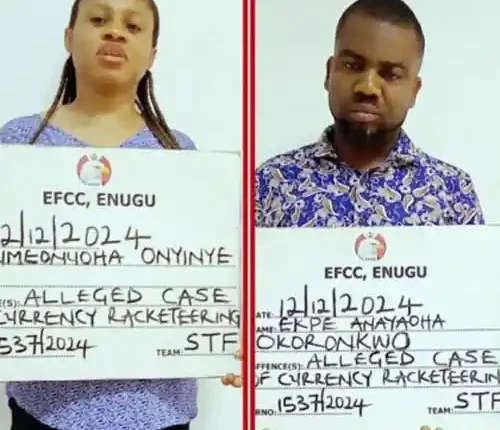EFCC Arraigns Two Zenith Bank Staff for Selling N500,000 in New Naira Notes
- Advertisement -
The Economic and Financial Crimes Commission (EFCC) has taken legal action against two employees of Zenith Bank, Ekpe Anayaoha Okoronkwo and Umeonuoha Onyinye, for allegedly engaging in currency racketeering. The duo is accused of selling N500,000 in newly-minted N200 notes to a buyer, an act that violates the Central Bank of Nigeria (CBN) Act of 2007.
Their arraignment before Justice Mohammed Garba Umar at the Federal High Court in Enugu highlights the EFCC’s continued crackdown on financial crimes, particularly in the wake of Nigeria’s ongoing monetary policies and efforts to curb illicit cash transactions.
Details of the Charges Against the Zenith Bank Employees
- Advertisement -
The Enugu Zonal Directorate of the EFCC brought the suspects to court following an investigation that linked them to unauthorized sales of newly-released banknotes.
Key Allegations
- Unlawful Sale of Currency: The defendants allegedly sold N500,000 in N200 denominations to one Husseini Ibrahim, violating the provisions of the CBN Act, 2007.
- Offence Under Nigerian Law: The charge specifies that their actions contravene Section 21 (4) of the CBN Act, 2007 and are punishable under Section 21 (1) of the same Act.
- Guilty Plea from Okoronkwo: While Ekpe Anayaoha Okoronkwo pleaded guilty, his co-defendant, Umeonuoha Onyinye, pleaded not guilty.
- Advertisement -
Official Charge Statement
The charge sheet presented to the court read:
“That you, Ekpe Anayaoha Okoronkwo and Umeonuoha Onyinye, sometime in October 2024 at Enugu, within the jurisdiction of the Federal High Court of Nigeria, did sell a total sum of Five Hundred Thousand Naira (N500,000.00) mints in Two Hundred Naira Notes (N200) denominations, issued by the Central Bank of Nigeria to one Husseini Ibrahim and thereby committed an offence contrary to Section 21 (4) of the Central Bank of Nigeria Act, 2007 and punishable under Section 21 (1) of the same Act.”
- Advertisement -
Legal Proceedings and Court Developments
During the court proceedings, EFCC Counsel Rotimi Ajobiewe requested a short date to review Okoronkwo’s guilty plea and prepare for Onyinye’s trial.
Key Court Decisions and Next Steps
- Trial Adjournment: The court set January 15, 2025, for Onyinye’s bail hearing and Okoronkwo’s sentencing.
- Legal Representation: Onyinye’s defense counsel, C. N. Agama, requested that she be remanded in EFCC custody pending bail proceedings.
- Remand Decision: Justice Umar remanded both defendants at the Enugu State Correctional Facility until their next court appearance.
Investigation and Arrest of the Suspects
- Advertisement -
How the EFCC Uncovered the Crime
The EFCC launched an investigation after receiving intelligence reports about suspicious cash transactions involving newly-minted naira notes.
- Date of Arrest: The two suspects were apprehended on November 15, 2024 at Zenith Bank’s branch on Okpara Avenue, Enugu.
- Findings: EFCC investigators determined that they had engaged in currency sales outside legal banking procedures, illegally distributing N500,000 in N200 notes to Husseini Ibrahim.
Role of Currency Racketeering in the Nigerian Economy
| Crime | Impact on the Economy |
|---|---|
| Currency Racketeering | Reduces cash availability in the banking system. |
| Black Market Sales | Increases inflation and distorts monetary policy. |
| CBN Regulation Violations | Undermines trust in financial institutions. |
Legal Implications of the Case
This case brings attention to the legal consequences of currency racketeering, an issue that has become prevalent following Nigeria’s recent cash scarcity challenges and banking reforms.
Relevant Sections of the Central Bank of Nigeria (CBN) Act, 2007
| Legal Provision | Implication |
|---|---|
| Section 21(4) | Prohibits unauthorized sales of CBN-issued currency. |
| Section 21(1) | Provides legal penalties for violators. |
| Banking Ethics Rules | Requires strict compliance with cash handling regulations. |
Violators of the CBN Act could face fines, imprisonment, or both, depending on the court’s ruling.
Public Reactions and Policy Implications
Government and Financial Authorities’ Response
- EFCC’s Stand: The anti-corruption agency has reaffirmed its zero-tolerance policy on financial crimes and pledged to prosecute all involved in currency racketeering.
- CBN’s Role: The Central Bank of Nigeria is likely to increase oversight on commercial banks to prevent similar violations.
- Financial Sector Impact: The case may lead to stricter regulations on bank cash transactions, ensuring better compliance with monetary policies.
Public Reactions
- Support for EFCC’s Action: Many Nigerians have praised the EFCC’s efforts in curbing illegal cash distribution, especially amid Nigeria’s efforts to control inflation and cash scarcity.
- Concerns About Banking Integrity: Some have expressed worries over internal corruption within banks, urging for better regulatory oversight.
- Debate on Punishments: While some believe stronger penalties should be imposed, others argue for leniency for first-time offenders.
Conclusion: Strengthening Nigeria’s Financial System
The arraignment of Zenith Bank employees Ekpe Anayaoha Okoronkwo and Umeonuoha Onyinye marks another significant step in Nigeria’s fight against financial crimes and banking misconduct.
Key Takeaways
✔ EFCC has intensified efforts to crack down on currency racketeering in Nigeria.
✔ The accused bank staff allegedly sold N500,000 in new Naira notes, violating the CBN Act, 2007.
✔ One pleaded guilty, while the other pleaded not guilty, leading to an adjournment until January 15, 2025.
✔ Stricter banking regulations are expected, as the government tightens its grip on financial institutions.
✔ Public opinion remains divided, with some calling for harsher penalties and others advocating for reform-oriented solutions.
As Nigeria continues to battle financial misconduct and regulatory breaches, this case serves as a warning to bank officials and institutions that non-compliance with monetary policies will not be tolerated.
Pay Attention To:
- Mass Sentencing: Over 200 Terrorism Suspects Receive Death and Life Sentences
- Sunday Skye McCann Biography, Age ,Net Worth, Parents
- Federal Government Announces 2025 Oil and Gas Block Auction Plans
- FCT Minister Wike Revokes 762 Land Plots in Abuja
- Dangote Refinery Slashes Petrol Price for Festive Season
- Advertisement -


